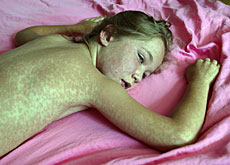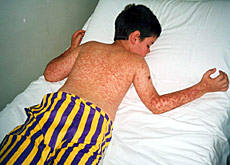Swiss need booster to meet measles target

Swiss health officials fear the country will fail to meet World Health Organization (WHO) vaccination targets aimed at eradicating measles in Europe.
The warning comes as Switzerland grapples with a measles outbreak, which is mainly affecting the central part of the country and has left one in ten victims needing hospital care.
Five years ago the WHO regional office for Europe launched a strategic plan to increase immunisation rates to 95 per cent of the population to eliminate measles and rubella (German measles) on the continent.
But while the Swiss rate has crept up to 86 per cent from 82 per cent four years ago, it is still some way off the WHO benchmark – and a source of concern for the Federal Health Office.
Of the 53 countries included in the WHO’s European region, 31 have already made the grade, according to latest figures.
Only nine still have a measles vaccination coverage of under 90 per cent: Switzerland, Britain, Belgium, Cyprus, France, Greece, Ireland, Italy and Malta.
“The vaccination rate in Switzerland is increasing very slowly, and there is a worry that it is not increasing fast enough to reach this 95 per cent target,” Jean-Luc Richard of the health office’s epidemiology and infectious diseases division told swissinfo.
“In fact we think it is too ambitious a goal right now for Switzerland, as it is for some other countries,” he added.
The current outbreak, which the health office has classed as an “epidemic”, has seen 414 infections since January, of which more than half have occurred in canton Lucerne.
According to officials, vaccination coverage in the central Swiss canton is particularly low, standing at just 78 per cent.
“In Lucerne there is a higher proportion of the population that uses alternative medicine and they tend to vaccinate less against measles,” explained Richard.
Vaccination plan
In Switzerland there is no specific measles and rubella elimination plan. But the MMR vaccine, which offers basic protection against measles, mumps and rubella, is recommended under the Swiss vaccination plan.
This is passed on to all doctors, who have to inform parents about recommended vaccinations, including the benefits and the risks.
People who contract measles can suffer from brain damage, pneumonia or even die. Vaccination has, however, been linked by some experts to autism or an increase in allergies among children.
“There is no real structured campaign for the promotion of the MMR vaccine in Switzerland,” said Richard. “But we feel there is a need.”
Not alone
Switzerland is not alone in struggling to reach the WHO target. Richard says neighbours Italy, Germany and Austria are all in the same boat.
According to a WHO report published last year, registered vaccination coverage in Austria for the first MMR dose was just under 80 per cent. The same report revealed that immunisation coverage in children aged 12 to 23 months in Italy was still below 70 per cent.
Sergei Deshevoi, who specialises in measles and rubella elimination at the WHO’s European office in Copenhagen, admitted that the targets were “quite ambitious” and would take time to be met.
“Unfortunately lack of adequate immunisation coverage is still a challenge in a number of countries of the region,” he said.
swissinfo, Adam Beaumont
Measles is an acute viral illness, which is highly contagious. The first sign of infection is usually high fever; after several days a rash develops over the body.
The most serious complications include blindness, encephalitis, severe diarrhoea, ear infections and severe respiratory infections such as pneumonia.
As of 2001, the MMR1 (first dose) has been recommended in Switzerland at the age of 12 months and MMR2 at age 15-24 months. Catch-up vaccination with two doses of MMR is recommended at any time until age 40 years.
Achieve and sustain at least 95% coverage with two doses of measles and at least one dose of rubella vaccine through high-quality routine immunisation services.
Provide a second opportunity for measles immunisation to susceptible groups.
Provide rubella immunisation opportunities to all rubella-susceptible children, adolescents and women of childbearing age.
Strengthen surveillance systems by rigorous case investigation and laboratory confirmation of suspected cases.
Improve the availability of high-quality, valued information for health professionals and the public on the benefits and risks associated with measles and rubella immunisation.

In compliance with the JTI standards
More: SWI swissinfo.ch certified by the Journalism Trust Initiative








You can find an overview of ongoing debates with our journalists here . Please join us!
If you want to start a conversation about a topic raised in this article or want to report factual errors, email us at english@swissinfo.ch.